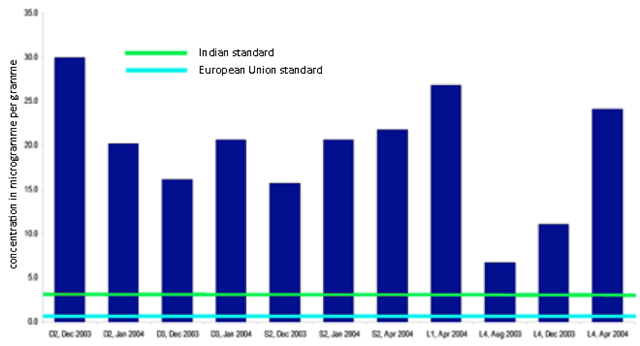

| Visitors Now: | |
| Total Visits: | |
| Total Stories: |

| Story Views | |
| Now: | |
| Last Hour: | |
| Last 24 Hours: | |
| Total: | |
Graph of the Day: Lead Concentrations in Spinach Grown in Varanasi, India
This graph illustrates lead concentrations in spinach grown in Varanasi, India. (Singh, et al., 2010)
Domestic wastewater comprises dissolved and suspended impurities from households. Untreated or insufficiently treated wastewater is typically contaminated with human excreta, which can cause traditional health risks. In recent years, domestic wastewater has been observed to contain trace quantities of pharmaceutical and narcotics, which would present health risks over prolonged exposure. However, in studies conducted in Australia, the United Kingdom, and the United States, scientists assure that such risks are highly unlikely as the level of contaminants do not approach significant levels (WHO, 2011a).
Pollutants found in industrial wastewater can be broadly classified into three categories: chemicals and heavy metals, organic matter, and fouling substances such as oil. The release of these pollutants into waterways varies by industry, which runs the gamut from manufacturing to mining to power generation. In most countries, there exists standards guiding the treatment of wastewater for release into waterways; however, these standards may not always be observed or implemented. Thus, water sources that receive industrial effluents may become tainted, and present health risks when used for drinking water or irrigation.
In Varanasi, a suburban middle-sized city in India, treated and untreated wastewater is used to irrigate crops. Over the long term, heavy metal pollutants (cadmium, copper, lead, zinc, nickel, and chromium) from the wastewater have leached into the soil, and can be detected in significant amounts in the vegetables grown in these farms.
While concentrations vary depending on the type of vegetable grown and the part of the vegetable that was sampled, some of the detected amounts greatly exceed allowable limits, rendering these vegetables unsafe for consumption. Agricultural pollutants include chemical compounds from fertilizers and pesticides, and animal waste. Run-off from farmland washes away into open water sources, causing contamination, oxygen depletion, and eutrophication (see Box 3 on Eutrophication in Lake Tai, China). Pesticides, which can leach into aquifers through soil, are also at risk of entering the food chain through bio-accumulation.
World confronts serious water crisis, former heads of government and experts warn in new report [pdf]
2012-10-12 01:27:05
Source: http://www.desdemonadespair.net/2012/10/graph-of-day-lead-concentrations-in.html
Source:



